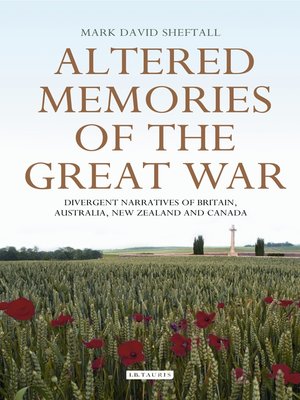Altered Memories of the Great War
ebook ∣ Divergent Narratives of Britain, Australia, New Zealand and Canada
By Mark David Sheftall

Sign up to save your library
With an OverDrive account, you can save your favorite libraries for at-a-glance information about availability. Find out more about OverDrive accounts.
Find this title in Libby, the library reading app by OverDrive.



Search for a digital library with this title
Title found at these libraries:
| Library Name | Distance |
|---|---|
| Loading... |
The experiences of World War I touched the lives of a generation but memories of this momentous experience vary enormously throughout the world. In Britain, there was a strong reaction against militarism but in the Dominion powers of Canada, Australia and New Zealand the response was very different. For these former colonial powers, the experience of war was largely accepted as a national rite of passage and their pride and respect for their soldiers' sacrifices found its focus in a powerful nationalist drive. How did a single, supposedly shared experience provoke such contrasting reactions? What does it reveal about earlier, pre-existing ideas of national identity? And how did the memory of war influence later ideas of self-determination and nationhood? Altered Memories of the Great War is the first book to compare the distinctive collective narratives that emerged within Britain and the Dominions in response to World War I. Britain, Canada, Australia and New Zealand endured equally grim experiences on the battlefield and all experienced major social upheaval as a result of the war. So why did Canadians, Australians and New Zealanders typically reject the more bitter representations of the war that so many people in Great Britain found compelling? During the inter-war years, men and women throughout the Empire struggled to come to terms with the huge losses of the Great War. Mark Sheftall explores how different communities re-imagined the experiences of war to form a collective memory which reflected the dominant opinion, although clearly not every individual conformed to the same views. This collective memory, he argues, can only be understood by exploring how new responses to the unprecedented experience of the conflict were shaped by long-standing conceptions of identity. Altered Memories of the Great War powerfully illuminates the differences as well as the similarities between different memories of war and offers fascinating insights into what this reveals about developing concepts of national identity in the aftermath of World War I.







